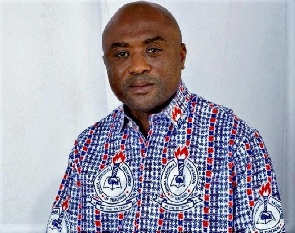 Thomas Musah is the General Secretary of GNAT
Thomas Musah is the General Secretary of GNAT
The Ghana National Association of Teachers (GNAT) has called for an urgent national stakeholder dialogue to reconsider the Free Senior High School (SHS) program in light of the nation's current economic situation.
GNAT, the teachers' umbrella body, suggests that this dialogue should focus on addressing the program's challenges and potential areas of improvement, Graphiconline.com reports.
Speaking on behalf of GNAT, the General Secretary, Thomas Musah, emphasized that critical issues up for discussion include the admission framework and processes, criteria for students' qualification, infrastructure and ancillaries, funding sources, participation of parents, corporate entities, parent-teacher associations, alumni, traditional authorities, and old students' associations.
Additionally, the availability of resources such as textbooks, stationery, equipment, and teacher training will be key points of discussion.
“As a critical stakeholder in the education enterprise, GNAT hereby calls for a drastic review and overhaul of the Free SHS Policy to ensure its smooth and successful implementation for the good of Ghana, our motherland.
“All concerned and interested bodies, agencies, academics, alumni associations, teacher unions, organised labour, and parents, among others, should be brought on board for this very crucial and important dialogue to ensure a very broad participation and voice in this national assignment.
"Expertise elsewhere on the African continent and the world at large could also be sought,” the GNAT General Secretary said.
The Free SHS program was launched in September 2017 by the NPP government as part of a campaign promise.
Initially conceived as the flagship policy of the New Patriotic Party (NPP) during the 2012 and 2016 general elections, recent challenges have led some quarters to advocate for a review, considering factors such as food supply issues.
Thomas Musah commended the initiative's intent but underscored the need for prudent execution. He acknowledged that while the Free SHS initiative is well-intentioned, the government faces resource constraints that make its full realization difficult.
The economic challenges and external debt restructuring efforts have impacted various sectors, including education.
Thomas Musah traced the evolution of Ghana's education system, highlighting the transition from cost-sharing arrangements between government and stakeholders to the government's assumption of paramount responsibility for education after independence.
The GNAT General Secretary said although the intention of the “Free SHS Policy is good, the reality is that the government lacks the resources to make it reasonably practicable.
“Again, it is putting more burden on taxpayers and preventing resources from other alternative uses in the economy,” he added.
He noted that while the Free SHS initiative is in line with popular demand for affordable education, economic realities and constraints must be addressed to ensure sustainability.
“Many even proposed a system of cost-sharing between government and stakeholders but the government would have none of it and decided to go solo, and the results are some of the challenges we are experiencing now.
“Added to these is the economic distress which has hit the country in recent times, culminating in government launching a comprehensive restructuring which involves both domestic and external debts, and running to the International Monetary Fund (IMF) for a three-billion dollar bailout to re-establish its debt sustainability,” he said.
“Consequently, government had to suspend the funding of many of its policies, programmes and projects, the Free SHS initiative not exempted.
“In essence, government is now pursuing measures meant to support its fiscal consolidation process to the detriment of all its projects,” he noted.
Ghana’s leading digital news platform, GhanaWeb, in conjunction with the Korle-Bu Teaching Hospital, is embarking on an aggressive campaign which is geared towards ensuring that parliament passes comprehensive legislation to guide organ harvesting, organ donation, and organ transplantation in the country.
AE